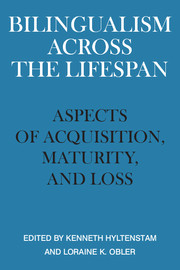Book contents
- Frontmatter
- Contents
- List of contributors
- Preface
- 1 Bilingualism across the lifespan: an introduction
- 2 Early differentiation of languages in bilingual children
- 3 Variation in children's ability to learn second languages
- 4 Idiomaticity as an indicator of second language proficiency
- 5 Prefabs, patterns and rules in interaction? Formulaic speech in adult learners' L2 Swedish
- 6 The imperfect conditional
- 7 Spanish, Japanese and Chinese speakers' acquisition of English relative clauses: new evidence for the headdirection parameter
- 8 Distinguishing language contact phenomena: evidence from Finnish–English bilingualism
- 9 The boustrophedal brain: laterality and dyslexia in bi-directional readers
- 10 Deterioration and creativity in childhood bilingualism
- 11 Crosslinguistic influence in language loss
- 12 Bilingualism in Alzheimer's dementia: two case studies
- 13 Language processing in the bilingual: evidence from language mixing
- Index
1 - Bilingualism across the lifespan: an introduction
Published online by Cambridge University Press: 05 June 2012
- Frontmatter
- Contents
- List of contributors
- Preface
- 1 Bilingualism across the lifespan: an introduction
- 2 Early differentiation of languages in bilingual children
- 3 Variation in children's ability to learn second languages
- 4 Idiomaticity as an indicator of second language proficiency
- 5 Prefabs, patterns and rules in interaction? Formulaic speech in adult learners' L2 Swedish
- 6 The imperfect conditional
- 7 Spanish, Japanese and Chinese speakers' acquisition of English relative clauses: new evidence for the headdirection parameter
- 8 Distinguishing language contact phenomena: evidence from Finnish–English bilingualism
- 9 The boustrophedal brain: laterality and dyslexia in bi-directional readers
- 10 Deterioration and creativity in childhood bilingualism
- 11 Crosslinguistic influence in language loss
- 12 Bilingualism in Alzheimer's dementia: two case studies
- 13 Language processing in the bilingual: evidence from language mixing
- Index
Summary
The large variety of questions dealt with in current research on bilingualism provides a rich potential for insights into human language processing. Research within the field has created a number of subdisciplines taking as their core specific issues, such as “early bilingual development”, “code-switching”, “second language acquisition” etc., with a broad range of methodologies and a diversity of assumptions and theories. The picture we get of bilingualism is thus one of a dynamic, rapidly developing field. No single researcher can hope to encompass more than a few aspects of bilingualism, leading to the necessity for specialization and concentration.
Thus, as usual, the other side of specialization is increasing isolation between those who work in different subdisciplines; cross-reference between the different fields is relatively rare. Therefore, a moment for reflection on the interrelationships between these subdisciplines would seem desirable at this point, stimulating researchers to pool their specialist knowledge on points of common interest. Ultimately, this should lead to a cross-fertilization of the whole field and new perspectives on specific topics.
The primary impetus for this book – and for the conference that motivated it – was a long-felt need to gauge how newer developments in bilingual research bear on the classical questions of how the bilingual's two (or more) language systems interact with each other and with other higher cognitive systems, neurological substrata and the social environment.
- Type
- Chapter
- Information
- Bilingualism across the LifespanAspects of Acquisition, Maturity and Loss, pp. 1 - 12Publisher: Cambridge University PressPrint publication year: 1989
- 2
- Cited by



